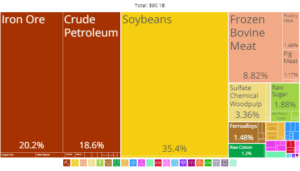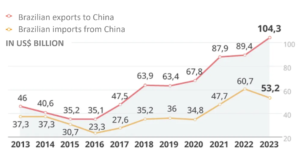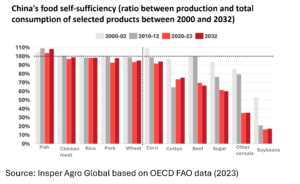Brazil's role in China's food security: a 50-year partnership
Learn more about trade relations between Brazil and China and the Latin American country’s role in the Asian nation’s food security.
In 2024, trade and diplomatic ties between Brazil and China celebrated their 50th anniversary. This partnership aims to diversify sources of supply and strengthen global food security.
The bilateral relationship between the countries has strengthened in recent years. In July 2024, Brazil increased exports to China by US$1.4 billion or 16.1%. To find out more about Brazil’s strategic role in this trade link and its impact on the world stage, read the full text on our blog.
Trade relations between Brazil and China
The United States Department of Agriculture (USDA) reports that Brazil is the world’s largest exporter of soybeans. This amount is largely sent to China, which is the biggest importer of this grain.
According to data from the Observatory of Economic Complexity, Brazil’s main exports to China are iron ore, soybeans and oil. See below:

Soy production in Brazil has become a fundamental part of food security policies and has contributed to China’s development and social stability since the early 2000s. On the Chinese side, there is a sectoral policy that is part of a broader development strategy, while in Brazil there is a pragmatic response aimed at taking advantage of an opportunity that has opened up.
In 20 years, China has become the largest consumer of Brazilian agricultural products, surpassing the European Union and the USA combined. In 2022, its share of Brazilian agricultural exports reached 32%, compared to just 2.7% in 2000, an increase of more than six times. Meanwhile, the share of the United States and the European Union fell from 41% to 23%.
The Asian country imported 30.7% of Brazil’s exports in 2023. China also maintained its position as the main supplier of manufactured goods to Brazil, with 22.1% of imports. See the data published by the channel that reports on trade between the countries:

Sources: MDIC and AEB
Read also:
- Brazil’s trade balance: understand the importance of commodities
Understanding food safety in China
As the largest supplier of basic agricultural products to China, Brazil plays a key role in the country’s food supply, especially with China’s growing demand for agricultural products. Currently, the Asian nation has only 8% of the planet’s arable land, while its population represents 20% of all the world’s people.
With these figures, China has applied different policies to guarantee the country’s food security. A study by Insper Agro Global, called China: Food Security and Growing Demand for Food, reports on the main measures adopted:
- Increased production of staple crops in China;
- Investment in agricultural infrastructure;
- Land reform and protection of arable land;
- Investment in technology;
- Self-sufficiency: domestic production of 95% of all grains consumed.
However, the country has relaxed its rules on some specific products, such as soybeans imported from Brazil. China’s internal focus at the moment will be on the production of the most consumed grains, seeking support from other nations for the rest. See the graph published by Insper Agro Global showing which products the country is self-sufficient in and which it is not:

How does Brazil fit into China’s food security strategies?
Today, the countries have forged a mutual relationship. Below, we can see the import and export data between these two nations and how much trade relations have grown in recent years:
Table 1. Mutual Dependence between China and Brazil in Agricultural Products
(Import and export values, in USD, for 2000 and 2023)
| Product | Exports Brazil → China+HK (USD million) | 2000 | 2023 | Growth (CAGR) | % per year |
| Soy Complex | 371 | 39,651 | 22% | 1st (74%) | 1st (68%) |
| Beef | 42 | 6,081 | 24% | 1st (55%) | 1st (40%) |
| Corn | 0.5* | 4,473 | 55%** | 1st (10%) | 1st (45%) |
| Pulp | 106 | 3,963 | 17% | 1st (38%) | 1st (20%) |
| Sugar | 0.1 | 1,910 | 56% | 1st (12%) | 1st (55%) |
| Chicken Meat | 75 | 1,707 | 15% | 1st (17%) | 1st (28%) |
| Cotton | 1.4 | 1,513 | 30% | 2nd (28%) | 2nd (28%) |
| Pork | 61 | 1,215 | 14% | 1st (44%) | 2nd (19%) |
| Total | 919 | 63,050 | 20% | 1st (38%) | 1st (18%) |
Source: Elaborated by Insper Agro Global based on data from SECEX (2024), UN Comtrade (2024), and TDM (2024).
Note: The agribusiness definition used is from MAPA.
- Number equivalent to the year 2002.
** CAGR covers the period from 2002 to 2023.
*** Position of China + Hong Kong as countries of destination for Brazilian exports and participation (%) in 2023.
● Increased demand for food in China
Even with a lower birth rate, China is still seeing an increase in demand for food due to a reduction in labor in the countryside, a shortage of arable land and rapid economic growth.
For this reason, relations between Brazil and China are expected to continue to evolve. According to the Brazil-China Business Congress (CEBC), the Latin American country still has opportunities ahead of it. The institution listed 216 goods that could be used in Chinese exports, seeking to diversify products.
Check out the list of areas developed by the CEBC in which Brazil can maintain, expand or start new exports with China:
- Seeds and oleaginous fruits;
- Ores;
- Mineral fuels;
- Meat and offal ;
- Cellulose (wood pulp);
- Cast iron;
- Cotton;
- Sugars;
- Hides and skins;
- Tobacco and tobacco products;
- Animal or vegetable fats and oils;
- And many others.
Source: Report “Exports from Brazilian States to China”
Read also:
- Agriculture: how important is it for food security?
New agreements have also strengthened the relationship between Brazil and China. The countries have discussed making financial transactions without the US dollar, as well as agreements to reduce costs and ease laws for Chinese companies to enter Brazilian borders. In 2022, for example, 32 new Chinese projects landed in Brazil. These are ventures in the energy, information technology, agriculture and other sectors.
As the two nations continue to develop trade strategies, it will be crucial to tackle emerging challenges and seize new opportunities to ensure a solid future for Sino-Brazilian relations. For now, China’s Food Self-Sufficiency Policy will still depend on Brazil’s exports, but the constant exchange between the two countries can still evolve.
Keep up to date with news from the world of commodities
Sign up to our blog newsletter to receive content like this, as well as other information on hedging, price risk protection and much more, directly to your inbox!
Subscribe now and follow the content prepared by professionals working in the market.






